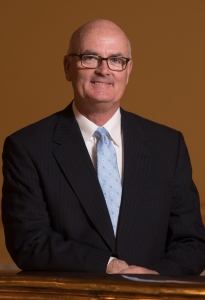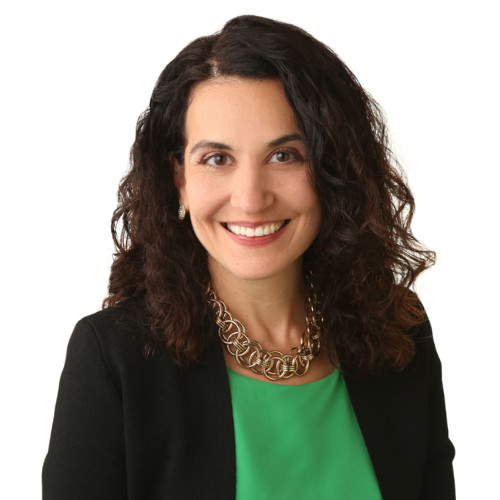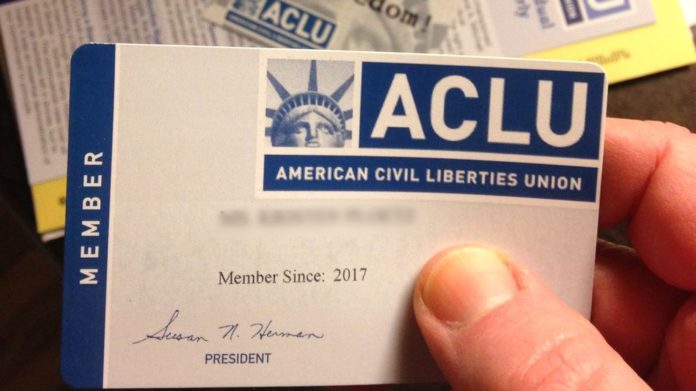When Micah Kubic took the helm of the American Civil Liberties Union of Kansas in 2015, it was a shell of what it is now.
It was running almost $100,000 in the red with a staff of essentially three — an executive director, a legal director and an office manager.
“We all sort of shared the load,” Kubic said of the skeleton staff he inherited.
“We did everything from advocating at the statehouse to filing the litigation to balancing the books to taking out the trash.”
Kubic arrived at a time when conservatives held sway in Topeka.
Sam Brownback had just been reelected governor. Kris Kobach had just won a second term as secretary of state. And conservatives controlled the statehouse.
“There was a lot going on that made it a very challenging time,” recalled Kubic, who now heads the ACLU’s Florida chapter. “We had our work cut out for us.”
While Kubic praises the work of his predecessors, he said the organization was overmatched in the political and legal battles it faced.
“It is fair to say there had been some wonderful people there that had done some really fantastic work,” he said.

“The organization was always punching above its weight but not capable of responding to the true scale of the threat that existed within the state,” he said.
Five years later, the ACLU of Kansas has gone through a renaissance.
It’s raising substantially more money. Its membership rolls have swelled. It has about quadrupled the size of its staff.
And it’s been involved in about two dozen legal cases, many of them successful.
The ACLU has made its biggest splash in litigation against Kobach over the state’s proof of citizenship law, which has been struck down twice in the lower courts but may still wind up at the U.S. Supreme Court.
The ACLU has brought a lawsuit against the Kansas Highway Patrol over drug busts on Interstate 70.
It is representing two environmentalists who say they were retaliated against for protesting fracking operations in the Flint Hills.
It represented a Roeland Park man who faced fines for having too many signs supporting President Donald Trump.
But the organization is not without its critics who question whether the organization has made much progress with the Legislature and suggest that it uses lawsuits to make headlines and raise money.
The organization has reached into many different aspects of state politics, even engaging in the 2018 Republican primary for governor when it sent out a flier comparing Kobach’s record to his rival, former Gov. Jeff Colyer.
A spokesman for Colyer called it a “dirty trick” to help Kobach win the primary and give Democrats an edge against a vulnerable candidate in the general election — an accusation Kubic denied.
Later that year, the ACLU spent more than $200,000 on a general election ad “educating voters” about Kobach during the general election against Gov. Laura Kelly.
The ACLU also went to court to force Ford County to open another polling site after Dodge City’s lone voting location was moved to a remote area outside of town that was not easily accessible. Ultimately, a second location was added and the first one changed.
And it has called out political leaders in Kansas for blocking the public on social media.
The organization’s presence is much different now from, say, a decade ago, when its footprint in state politics seemed smaller, lawmakers said.
“I’ve definitely seen a change,” said Democratic state Rep. Jim Ward, who has been in the Kansas House since he was elected in 2002.

In his early days in the Legislature, Ward recalls receiving what he described as “perfunctory” letters on issues. Now, there’s much more face-to-face lobbying.
“Before, they were around, but they didn’t have near the energy,” Ward said.
Now it’s different, he said.
They’re involved in any number of issues, whether it’s voting, abortion, corrections, free speech or discrimination.
“You just see their fingers in a lot of different pies,” he said.
Sheer numbers tell the story of the ACLU’s growth in Kansas. Consider:
- The ACLU’s foundation has seen fundraising triple, from about $382,000 in 2014-15 to about $1.2 million in 2018-19, according to federal tax returns. It ran an $87,000 deficit in tax year 2014-15.
- The foundation had almost $1.4 million in assets as of March 2019, compared to about $184,000 in March 2014.
- The number of dues-paying members has more than doubled to 6,222 in 2019 from 2,618 in 2015.
- The group’s email list has climbed to 31,231 last year from 10,865 in 2015.
Organization leaders attribute some of the group’s struggles before 2015 to the fact that the ACLU was split between all of Kansas and western Missouri.
“With that, we were a little disjointed in having to deal with two different legislatures,” said Susan Estes, chair of the ACLU of Kansas’ board of directors.
The organization concentrated its efforts in Kansas about six years ago, setting the stage for a new era of growth that brought the ACLU to where it is today.
Many of those interviewed credited Kubic with the ACLU’s ascendance in recent years where the organization has become more assertive, both legally and politically.
Kubic came to the ACLU from the Full Employment Council, where he worked as director of planning, development and evaluation.
He cut his teeth in Kansas City politics while serving as the legislative director of former Kansas City, Mo., Councilman Troy Nash.
“He really put the work into building an infrastructure for the organization and to put it on solid footing,” Estes said.
“He came in and had to kind of re-envision the organization,” she said. “It was a little just stagnant, and he had to come in and sort of rebuild the system.”
Estes said the Kansas affiliate had been mired in the idea that it was a small chapter, and Kubic encouraged its local members to think on a larger scale.
“Micah kind of had a bigger vision for how to (develop) a more active statewide presence, how to build a really good staff and how to think strategically about how to get things done. He was that person for the organization.”
Kubic, who left Kansas at the end of 2018, said he thought the local ACLU needed to sharpen its focus. At one point, he counted 87 issues listed on the national organization’s website.
“There were three of us. We could not respond to 87 things and do it well,” he said. “We really decided to narrow it down and home in on a couple of the most urgent issues and then throw absolutely everything that we had behind those.”
And the most important of those, he said, was challenging Kobach’s “extremist voting rights agenda,” most notably the proof-of-citizenship law for registering to vote.
“When we threw everything behind it, really threw ourselves into it, dedicated ourselves to it — woke up in the morning thinking about it, went to bed at night thinking about it — we were able to have an impact.”
The ACLU, he said, was a place for Kansans to coalesce against the policies of Brownback and Kobach.
“It’s a combination of strategy, hard work and people really genuinely, passionately disagreeing with some of the things that their government was doing and wanting to come together to do something about it, and the ACLU was a great place for folks to do that,” Kubic said.
Estes noted that the ACLU’s growth in Kansas corresponded with the election of President Trump.
In the first 15 months after Trump’s election, membership for the ACLU at the national level soared from 400,000 to about 1.8 million.
Before Trump’s election, the national ACLU reportedly averaged between $3 million and $5 million in online donations per year.
But in the year after Trump won, the organization reportedly raised just under $120 million in online donations.
And as the national organization grew, it put more resources into the Kansas chapter, which subsequently grew as well.
And while the organization isn’t ready to send any thank you notes to Kobach, Estes acknowledged that the former secretary of state gave its members a rallying point.
“Not only did we have somebody in the state who was doing things that were infringing on Kansans’ rights, he was exporting it all around the country,” Estes said. “It was at a point where we needed to take care of this.”
But the organization’s advocacy hasn’t been limited to Kobach’s policies.
It went to bat for students in Johnson County claiming that the Shawnee Mission School District censored students and violated their free speech rights during a 2018 walkout to protest gun violence. The case was settled.

It also took the state to court over a law barring state contractors from boycotting Israel, alleging it violated free speech rights. The lawsuit was dropped after the Legislature changed the law.
Now, the ACLU of Kansas has a new executive director, Nadine Johnson, a former political science and law professor who most recently worked as manager of strategic operations and community engagement efforts for Google.
“We are a nonpartisan organization. That’s the tenor that we take. That’s the position we have,” Johnson said.
“I understand that there are folks who have different viewpoints and, of course, we welcome those. Our entire mission is to uphold and seek the enforcment of the civil liberties of Kansans.”
Others don’t see it that way. In some quarters, they’re seen as overly litigious with a partisan agenda.
It was a point that Scott Schwab, the current secretary of state, made when Kansas settled the lawsuit with the ACLU over the interstate voter crosscheck program.
He said his office in the future expected “disagreements to be resolved responsibly, through communication and collaboration, not courtroom confrontations motivated by financial gain at taxpayer expense.”

In an interview, Schwab said the ACLU is less about advocating for civil liberties than trying to advance a political agenda.
“It’s no longer about civil liberties,” he said. “It’s about trying to stick it to people who don’t think like them in a court system.
“They don’t want to solve the problem,” he said. “They just want to go to court and try to pummel you in court make you feel like you’re doing something incompetent.”
Schwab cites the ACLU’s lawsuit over the buffer zone intended to prevent electioneering at polling places but that it says is stifling free speech.
He said the ACLU didn’t try to work with his office to resolve the issue, but instead went to court.
“They want to score political points,” he said. “They have to show they’re winning somehow or their fundraising does go down.”
Mark Johnson, a Kansas City attorney and who sits on the ACLU’s board of directors, said the organization doesn’t pursue lawsuits out of spite.
“We have to sue people sometimes to get their attention, but we don’t do it maliciously,” Johnson said. “We don’t do it for grandstanding. We always have a goal in mind.”
While some lawmakers agree that the ACLU is successful in court, they say the organization has not made much of a dent in the Legislature.
House Majority Leader Dan Hawkins called the ACLU’s influence “marginal at best.”
“They’re successful at maybe winning some lawsuits, but if you took a poll of Republicans and asked them if they appreciate the ACLU, I think you would find very few that say yes,” he said.
“The ACLU is always out there pushing the liberal agenda envelope,” he said. “It’s almost like they want chaos, they want pandemonium.”
He pointed to the ACLU’s litigation on behalf of several Medicaid expansion protesters who were ordered out of the Capitol after unfurling mammoth banners in the rotunda.
The protesters were banned from the building for a year, a punishment that was lifted.
“Does anybody in their right mind think it’s right to be able to walk into the Capitol and unfurl a 24-foot sign?” he said. “Where does it stop? Do we just want our state Capitol to be trashed? Is that what we want? No, we don’t want that.”
Republican state Rep. Tom Cox said the ACLU is a polarizing force in Kansas politics.
“They have a lot of influence with the left and virtually none with the right,” Cox said. “The left will see what they do and assume that it’s correct, and the right will see what they do and assume that they are wrong.”
Kubic, however, points out that the ACLU has worked hand-in-hand with conservatives on criminal justice reform.
“If the ACLU cared about partisan politics, for example, then we wouldn’t have worked as closely as we did with folks on the right about criminal justice reform,” he said.
“It is true that the organization has principles,” Kubic said. “There are some folks who don’t favor those principles and those values. That’s OK. But it’s the job of the ACLU not to back down because other people disagree or feel uncomfortable.”













